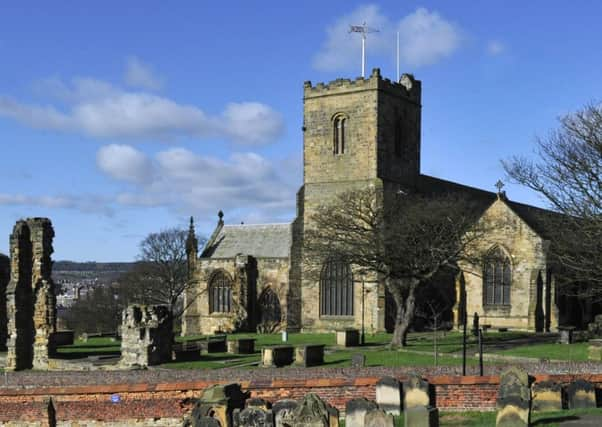Nostalgia: Misrule and disorder in church


Lesser offences against church discipline are also recorded at this time. In September 1631, the Common Hall found it necessary to impose a fine of sixpence on the father of a child under the age of three who had disturbed church services with its crying.
Finally, in the summer of 1634, William Moone and Thomas Fiddie were each fined sixpence “for walking in the church”. William Moone’s name was not one of the pewholders the following year, but Thomas Fiddie shared his in the north aisle or “Little Allee” with two others.
Advertisement
Hide AdAdvertisement
Hide AdChurch attendance on Sundays and feast days was not an option: by statute law it was compulsory for all the king’s subjects. Failure to attend, if noticed and recorded by the churchwardens, might incur a fine of one shilling. A repeated absentee could be charged up to £20 for missing four consecutive Sundays or, in the worst cases, might face excommunication.
In practice, there were two kinds of parishioners who stayed away from St Mary’s, a handful of Catholics and a majority who were too old, too sick, too lazy or just too indifferent to climb the hill. Scarborians at sea had a legitimate excuse, but those who wilfully enjoyed themselves on Sundays instead of attending church were the ones who were most likely to incur the displeasure and punishment of the town’s magistrates.
There were two types of Catholics: ardent believers in the old faith who openly refused to obey the law and outward conformists, who paid lip service to the Anglican establishment and practised their faith in secret. The former were called “recusants”, the latter “church papists”. After the exposure of the Gunpowder Plot of 1605, legal penalties against recusants became increasingly harsh, though their treatment often depended crucially on the attitude of local justices. Recusants were compelled to baptize their children and see them married in an Anglican church and forbidden to keep Catholic servants or Catholic teachers in their homes. Harbouring a Catholic priest was a capital crime.
However, Catholic recusants were rare in Scarborough. Only about half a dozen have been identified in the town during the long reign of Elizabeth and under the Stuarts fewer still for certain. William Lawson or Lowson seems never to have attended church during the last six years of his life. His will of 1626 shows that he was a substantial landowner of about 30 acres of pasture and arable in the fields of Scarborough and Falsgrave, which he divided amongst his daughter and five sons.
Advertisement
Hide AdAdvertisement
Hide AdWith John Wolfe, head of a large family of tanners and sadlers, living in St Thomas Street (known later as Tanner Row) we are on safer ground. After persistent absenteeism throughout a decade, aged 60 he was ordered to appear before the county sheriff as “an obstinate recusant”. Two years later, he was once again presented at the general sessions in Scarborough as “a recusant for not repairing to his parish churche to heare divine service & sermon for one hole yeare last past”. Another member of this Wolfe clan, William, who later changed his name to Lacy, became a Jesuit priest and a distinguished theologian.
Some regular absentees from St Mary’s seem to have conformed after warnings, but others were clearly defiant rebels. Thomas Burton was frequently at odds with Falsgrave’s bye-lawmen and on one occasion was accused of deliberately “clapping dung” on Newborough Bar. Mary Harwood was also a prolific, violent trouble-maker and her absence probably had no religious explanation. The same applied to Ann Barry, whose public whipping for bearing a bastard seems to have made her less rather than more obedient.
All outdoor games, recreations and employment were strictly forbidden “in the time of divine service”. The court orders of the period give a good indication of how Scarborians then enjoyed their leisure. The list of banned activities is a long one. Football is mentioned most frequently, but there are also references to “trippit”, “coits”, “swechpoynt”, and “joyling ball”. Indoor games were harder to detect by the authorities, but we have “knacks”, “tables”, “cards”, “shovelboard”, “gamesters” and, most bizarre, “playing on the Jews harp”. But the most commonly cited misdemeanour on a Sunday was drinking in company. George Boyes was fined the staggering sum of ten shillings for “sufferinge men to sitt drincking in his house”. Perhaps it was not his first offence of this kind.
What we would regard as innocent recreations, such as “walking on the sands”, were then considered acts of defiance if they occurred during church services. Nor were you allowed to work or trade on Sundays. Six men and two women were before the court for “carrying burdens of wood & cole in tyme of dyvine service”. On 4 July 1647, Andrew Grant was seen to be “traveling towards Semer fair with a pack on his back.” After he had been forewarned by the churchwardens, John Barwick foolishly opened his shop front on a Sunday and Nicholas Porret was in trouble for “gathering roopes in sermon tyme”.
Advertisement
Hide AdAdvertisement
Hide AdEven child abusers had to take at least one day off a week. In 1660, Will Wret, a mason, was presented at the sheriff’s tourn for beating a boy called Ralf on a Sunday. Presumably, he should have waited until Monday.